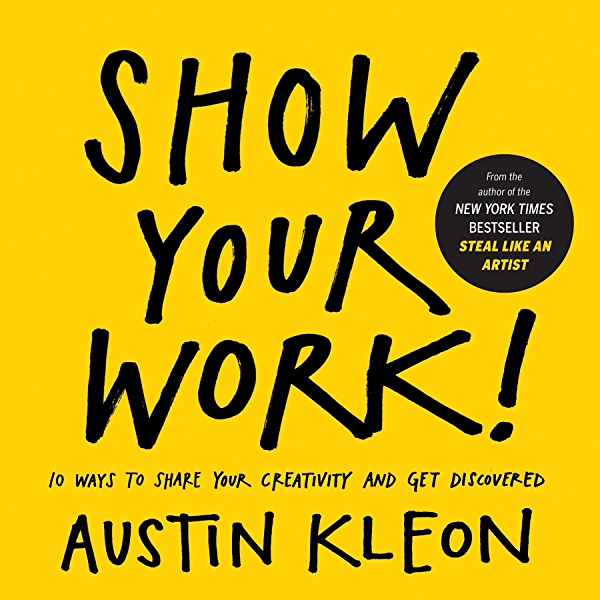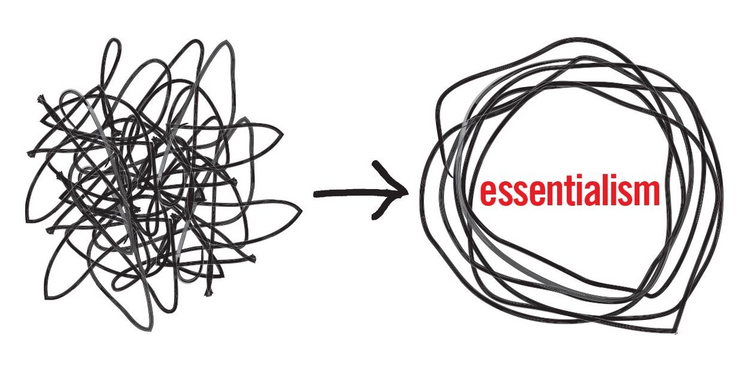Show Your Work (Austin Kleon)

📗 Book Info
Show Your Work by Austin Kleon (ISBN: 9780761178972)
Reading time: <1 Week Price: €8.99 for Kindle
The trouble is, we don’t always know what’s good and what sucks. That’s why it’s important to get things in front of others and see how they react.
🔍 How I found this book?
- The book itself is one of Ali Abdaal's most gifted books (his review here)
- Currently I am pursuing reading on the themes of: sharing my work during the process of completing my PhD (blogging), meta-learning (or how to learn about big topics effectively), and effective essentialism
⏱️ What is the book about
In its essence, the book is about sharing your work online, with a primary focus on what to share, what to expect when sharing, and to some extent what the end-result could be
The structure of the book comes in roughly three parts. First, why everyone should share. In particular, being an amateur or on the path to learning something is ideal because it is easier to think out loud about it. Additionally, your readers find you IF you have a product (networking by itself is less impactful, using the network generated by your product is more sustainable). Part two is about what to share. The first principle is to be a documentarian of what you do, to write down all your thoughts (or take a voice recording - we almost all have phones...). Step two is to use that documentation to pick out a thought / question and share it. We won't know if it's useful or a dead end until we put it out there (Twitter would be a good tool). This requires structure and habits (post on Atomic Habits by James Clear coming soon) to do.
Part 3 concerns how to share. The first principle is to post only what you are ready to be shared everywhere (if you're not sure, save it, come back to it in 3 days). Focus on what you do and link + credit others for their work. Finally, it is all a pitch, we need to tell good stories, we want to know where things come from, how they got made, and who made it. Your listener is the hero who gets to choose what happens at the end.
Part 4 is about the table manners of sharing. Find a community to be part of (in my case academics working on complexity economics), and become a good citizen of that community. Be a fan! With that said, be able to take a punch and take some. The more criticism I take, the more I realise that it cannot hurt me.
Once you have an audience, you can turn them into patrons. You should be generous in sharing content, but it is important to remain selfish about your time, energy and focus in order to get that work done. The longer you stick around, the more likely you will be successful. Simply picture yourself in two years, having posted once a week...
🤔 The Good and the Bad
✅ The book is condensed into small sections, and easy to read and understand. It also has a great collection of quotes (see in the notes below).
✅ It is particularly great for those of us starting out sharing and blogging. It is a pre-packaged choice of the essentials to focus on: note thoughts → share one a day → be a participant in your community → grow over time.
✅ It makes sharing work-in-progress seem exciting and valuable, and a step away from purely outcome-based publishing (though we still edit...)
⁉️ I think it is less powerful on the need and philosophy of the process than Seth Godin's book. It is more of an addendum on how to share
⚡What was the effect of this book?
I think the lessons for this book resonated most with building an audience for myself, and having the courage to send my writings to others. It has prompted me to make sure I write regularly, and also post regularly as an Amateur - without needing to know everything about a particular set of models, techniques or prior works.
💬 Quotes and Highlights I Made**
Section 1 - A New Way of Operating
"You don't really find an audience for your work; they find you. But it's not enough to be good. In order to be found, you have to be findable."
Section 2 - You Don't Have to be a Genius
Find a scenius - a scene or a community of people interested in the same topics as you, and share with them. Very few things are created by a lone genius. Anyone can contribute to the community - you can start by thinking about the smallest viable contribution.
"The best way to get started on the path to sharing your work is to think about what you want to learn, and make a commitment to learning it in front of others. Pay attention to what others are sharing, and then start taking note of what they're not sharing"
“Remembering that I’ll be dead soon is the most important tool I’ve ever encountered to help me make the big choices in life. Because almost everything—all external expectations, all pride, all fear of embarrassment or failure—these things just fall away in the face of death, leaving only what is truly important. Remembering that you are going to die is the best way I know to avoid the trap of thinking you have something to lose. You are already naked" - Steve Jobs
Section 3 - Think Process, Not Product
Audiences not only want to stumble across great work, but they, too, long to be creative and part of the creative process. By letting go of our egos and sharing our process, we allow for the possibility of people having an ongoing connection with us and our work
Become a documentarian of what you do. Start a work journal
In essence what you share will then just be the outcome of your thoughts and ideas as you are learning. It also avoids the frustration of trying to share for sharing's sake.
Section 4 - Share Something Small Every Day
The trouble is, we don’t always know what’s good and what sucks. That’s why it’s important to get things in front of others and see how they react.
“One day at a time. It sounds so simple. It actually is simple but it isn’t easy: It requires incredible support and fastidious structuring.” —Russell Brand
Ideally, you want the work you post online to be copied and spread to every corner of the Internet, so don’t post things online that you’re not ready for everyone in the world to see.
Section 4 - Open Up Your Cabinet Of Curiosities
A lot of the writers I know see the act of reading and the act of writing as existing on opposite ends of the same spectrum: The reading feeds the writing, which feeds the reading.
Don't share things you can't properly credit. Find the right credit, or don't share
Section 5 - Tell Good Stories
To be an effective contributor, we need to be good storytellers. Most things we share are pitches.
A good pitch is set up in three acts: The first act is the past, the second act is the present, and the third act is the future. The first act is where you’ve been—what you want, how you came to want it, and what you’ve done so far to get it. The second act is where you are now in your work and how you’ve worked hard and used up most of your resources. The third act is where you’re going, and how exactly the person you’re pitching can help you get there. Like a Choose Your Own Adventure book, this story shape effectively turns your listener into the hero who gets to decide how it ends.
Section 6 - Teach What You Know
“The impulse to keep to yourself what you have learned is not only shameful, it is destructive. Anything you do not give freely and abundantly becomes lost to you. You open your safe and find ashes.” —Annie Dillard
Section 7 - Don't Turn Into Human Spam
If you want fans, you have to be a fan first. If you want to be accepted by a community, you have to first be a good citizen of that community.
“Whatever excites you, go do it. Whatever drains you, stop doing it” - Derek Sivers
Section 8 - Learn To Take A Punch
You can't control the types of criticisms you receive, but you can control how you react to it
Compulsive avoidance of embarrassment is a form of suicide. - Colin Marshall.
Section 9 - Sell Out
Be ambitious. Keep yourself busy. Think bigger. Expand your audience. Don’t hobble yourself in the name of “keeping it real,” or “not selling out.” Try new things. If an opportunity comes along that will allow you to do more of the kind of work you want to do, say Yes. If an opportunity comes along that would mean more money, but less of the kind of work you want to do, say No.
Above all, recognize that if you have had success, you have also had luck — and with luck comes obligation. You owe a debt, and not just to your gods. You owe a debt to the unlucky"- Michael Lewis
Section 10 - Stick Around
"Work is never finished, only abandoned" - Paul Valery
When you feel like you've learned whatever there is to learn from what you're doing, it's time to change course and find something new to learn so that you can move forward
When you get rid of old material, you push yourself further and come up with something better. When you throw out old work, what you're really doing is making room for new work
*Cover picture credit goes to Austin Kleon at
**Almost all of these are quotes directly from Show Your Work by Austin Kleon




